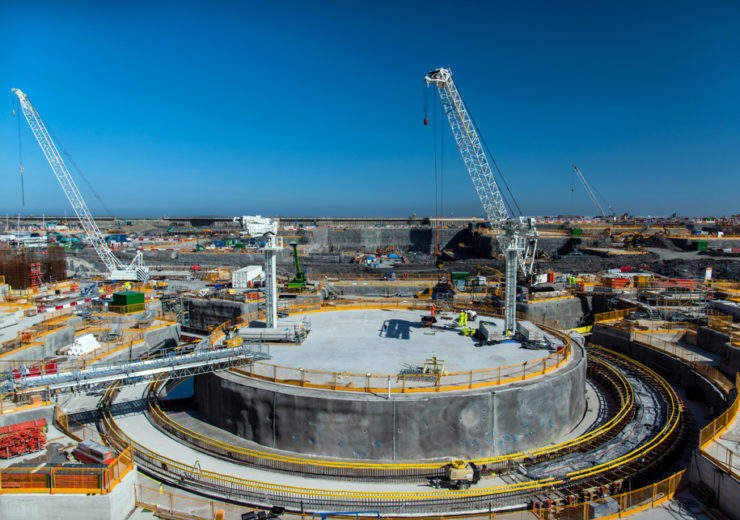The Hinkley Point C nuclear power station project is to be the first to be constructed in the UK since the mid-1990s - but a deal between the British government and businesses backing the project is being challenged by the Austrian government

Sizewell C will be almost identical to the Hinkley Point C, pictured, nuclear power station project (Picture: EDF)
Britain’s upcoming nuclear power station Hinkley Point C has been on the cards for decades but has faced a number of setbacks – and could now be hit by another.
Construction work on the £20bn plant in Somerset, England, has been ongoing since 2016 but the possibility remains that it may have to be halted.
A verdict on the European Commission decision to approve a Hinkley Point subsidy deal in 2014 will be delivered by the European Court of Justice (ECJ) tomorrow (Thursday 12 July), responding to a challenge brought forward by the Austrian government in 2015.
Should the decision to approve the nuclear power station project owned and backed by French utilities giant EDF Energy and the China General Nuclear (CGN) group be revoked by the court, it is unclear what will happen to the project post-Brexit.
It could face a delay of mere months or a colossal barrier, depending on what deal the British government and the European Union strike on regulations and ECJ rulings before Britain leaves the bloc.
A lot of jobs are riding on the future of the project. EDF Energy claims that Hinkley Point C will create 25,000 employment opportunities and that 3,100 people are working on-site at present.
It is also believed that several hundred people will be employed to operate the nuclear power plant once its construction has been completed.
Compelo has taken a look at the nuts and bolts of the Hinkley Point C project and why the Austrian government is challenging it.
What is Hinkley Point C?

Hinkley Point C is a nuclear power station in Somerset that EDF Energy claims will produce low-emission energy to six million homes when it is up and running.
The two nuclear reactors will be the first to be built in the UK since the Sizewell B station on the Suffolk coast began producing power 23 years ago.
EDF Energy – a largely state-owned French utilities firm – has the lion’s share of the project. The completely state-owned Chinese CGN group has a 33% share in the power station.
EDF and CGN are paying the initial costs of constructing the power station – as much as £20.3bn – in exchange for a controversial financing deal struck with the British government that allows the companies to flog every megawatt-hour of electricity for a guaranteed price of £92.50.
In April, the market price was £50.74, according to Ofgem.
The Telegraph reported in July last year that the deal could cost energy consumers £50bn over the purported 60-year lifespan of the project – meaning EDF and CGN will get way more than a return on their investment.
In return for the deal, the government requires majority owner EDF to alert it in the event that it wants to sell its shares in the nuclear power station.
Critics of the project feel that it will have been made redundant by emerging renewable energy technologies when it is expected to be producing power in the mid-2020s.
EDF Energy claims on its website that the nuclear power station’s two reactors will displace nine billion tonnes of carbon dioxide emissions annually – or 600 million tonnes over the 60 years it is planned to operate.
Hinkley Point C will follow on from its predecessor power stations in the Somerset region – Hinkley Points A and B.
Hinkley Point B is expected to close in 2023 – following the closure of Hinkley Point A at the turn of the millennium.
Why is the Austrian government challenging Hinkley Point C?

Austria began its lawsuit against the European Commission’s (EC) decision to approve Hinkley Point C in 2015, claiming the guaranteed electricity price deal was a form of state aid.
State aid is prohibited by the European Union except in scenarios where “it is justified by reasons of general economic development,” according to the EC’s website.
In its suit filing, the Austrian government also alleges that the British government did not offer a public procurement procedure for the project before making a deal with EDF and CGN.
Further issue has been taken with the EC approving the plan because the Commission believed the nuclear power station to be new technology.
The suit filing reads: “In that regard, it is claimed that the decision is also void because the Commission wrongly relies on the fact that the technology at issue is new technology.”
Greenpeace challenge Hinkley Point C decision
Austria revealed it would be challenging the approval in court after nine energy companies from Germany and Austria filed a suit of their own alongside the environmental activist group Greenpeace.
The legal challenge submitted by Greenpeace to the ECJ contesting the approval of Hinkley Point C was rejected on 10 October 2017.
The ECJ turned down the application because it ruled that Greenpeace could not show that the deal negatively impacted on its ability to compete in the energy market, according to a blog by fellow environmental campaigners Friends of the Earth.
Picture: EDF


